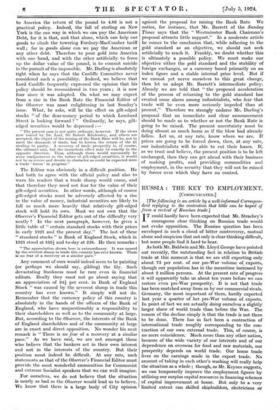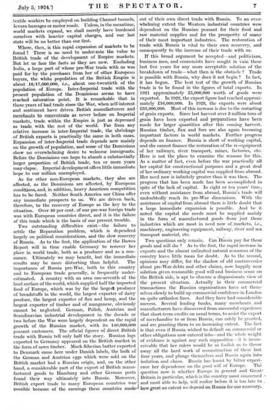RUSSIA : THE KEY TO EMPLOYMENT.
[COMMUNICATED.] [The following is an article by a well-informed Correspon- dent replying to the contention that little can be hoped of from a revival of Russian trade.] IT could hardly have been expected that Mr. Strachey's courageous clear thinking on Russian trade would not evoke opposition. The Russian question has - been enveloped in such a cloud of bitter controversy, mutual abuse and suspicion that not only is clear thinking difficult, but some people find it hard to bear.
As both Mr. Baldwin and Mr. Lloyd George have pointed out recently, the outstanding fact in relation to British trade at this moment is that we are still exporting only about 75 per cent. of our pre-War volume of exports, though our population has in the meantime increased by about 2 million persons. At the present rate of progress it will apparently take us about ten years before we can restore even pre-War prosperity. It is not that trade has been snatched away from us by our commercial rivals. Germany, the most important of them, hardly exported last year a quarter of her pre-War volume of exports. In point of fact we are actually doing ourselves .a slightly larger share of world trade than before the War. The reason of the decline simply, is that the trade is not there to be done. There has in fact been a contraction of international trade roughly corresponding to the con- traction of our own external trade. This, of course, is no mere coincidence, Much more than any other nation, because of -the wide variety of our interests and of our dependence on overseas for food and raw materials, our prosperity depends on world trade.- Our home trade lives on the earnings made in the export trade. No amount of taking in each other's washing will really help the situation as a whole ; though, as Mr. Keynes suggests, we can temporarily improve the employment figures by utilizing our surplus capital resources in financing schemes of capital improvement , at home. But only to a very limited extent can skilled shipbuilders, electricians or textile workers be employed on building Channel tunnels, Severn barrages or motor roads: Unless, in the meantime, world markets expand, we shall merely have burdened ourselves with heavier capital charges, and our last state will be no better than our first.
Where, then, is this rapid expansion of markets to be found ? There is no need to under-rate the value to British trade of the development of Empire markets. .But let us face the facts as they are now. Excluding India, a large part of -whose pre-War trade. with us was paid for-by-the purchases. from. her of other European buyers, the white. population of the British Empire is about .16/17,01X),000; i.e., about one-twentieth - of the population. of Europe. Inter- Imperial trade with the present population of the. Dominions seems. to have reached _saturation point.. it is remarkable that in these years of badtrade since the War, when self-interest and sentiment have driven _British .manufacturers and merchants to concentrate as, never before on Imperial markets, trade within_ the_ Empire is just as depressed as trade with the rest of the world. Far from any relative increase in inter-Imperial trade, the 'shrinkage of British exports is practically the same in both cases. Expansion.of inter-Imperial trade depends now mainly on the growth of population, and some of the Dominions show no overwhelming desire to welcome immigrants. Before the Dominicms can hope to absorb a substantially larger: proportion . of British trade, ten or .more years may elapse. . Imperial development offers little immediate hope.. to our million unemployed.
As for other non-European markets, they also are affected, as the Dominions are affected, by European conditions, and, in addition, heavy American competition has to be faced. Neither South America nor China offer any immediate prospects to us. We are driven back, therefore, to the recovery of Europe as the key to the situation. Over 40 per cent. of our pre-war foreign trade was with European countries direct, and it is the failure of this trade which is the basis of our present trouble.
Two outstanding difficulties exist—the failure to settle the Reparation problem, which is dependent largely on political considerations, and the slow recovery of Russia. As to the first, the application of the Dawes Report will in time enable Germany to recover her place in world trade, both as a producer and as a con- sumer. Ultimately we may benefit, but the immediate results may be more disturbing than helpful. The importance of Russia pre-War, both to this country and to European trade generally, is frequently under- estimated. A country with an area one-seventh of the land surface of the world, which supplied half the imported food of Europe, which was by far the largest producer of breadstuffs in the world, the largest exporter of dairy produce, the largest exporter of flax and hemp, and the largest exporter of timber and of manganese, obviously cannot be neglected. German, Polish, Austrian and Scandinavian industrial development in the decade or two before the War were largely dependent on the rapid growth of the Russian market, with its 140,000,000 peasant customers. The official figures of direct British trade with Russia tell only half the story. Russian logs exported to Germany appeared on the British market in the form of sawn timber. Much Siberian butter exported to Denmark came here under Danish labels, the bulk of the German and Austrian eggs which were sold on the British market had a Russian origin, and, on the other hand, a considerable part of the export of British manu- factured goods to Hamburg and other German ports found-_ their way ultimately into Russia. Moreover, British export trade to many European countries was- possible because of the earnings these countries made• out of their own direct trade with Russia. To an over- whelming extent the Western industrial countries were dependent on the Russian peasant for their food and raw material supplies and for the prosperity of many -of their most important industries. The restoration of trade with Russia is vital to their own recovery, and consequently to the increase of their trade with us.
If this broad argument be accepted—and politicians, business men, and economists have sought in vain these last five years for any more acceptable solution of the breakdown of trade—what then is the obstacle ? Trade is possible with Russia, why does it not begin ? In fact, it has begun. The best test of the growth of Russian trade is to be found in the figures of total' exports. In 1921 approximately £5,000,000 worth of goods were exported. In 1922, the export figure had reached approxi- mately £16,000,000. In 1923, the exports were about £35,000,000. Most of this increase is due to the restarting of grain exports. Since last harvest over 3 million tons of grain have been exported and preparations have been made for larger quantities after this coming harvest.
Russian timber, flax and furs are also again becoming important factors in world markets. Further progress depends on finance. Russia is short of working capital, and she cannot finance the restoration of the re-equipment of her railways, river transport, mines, factories, etc. Here is not 'the place to examine the reasons for this.
As a matter of fact, even before the war practically all her capital for constructional purposes and a great deal of her ordinary working capital was supplied from abroad.
Her need now is infinitely greater than it was then. The progress that has been made has been accomplished in spite of the lack of capital. In eight or ten years' time, even without assistance from abroad, Russia's trade will undoubtedly reach its pre-War dimensions. With the assistance of capital from abroad there is little doubt that a large immediate expansion is possible. And be it noted the capital she needs must be supplied mainly in the form of manufactured goods from just those industries which are most in need now of, markets, i.e., machinery, engineering equipment, railway, river and sea transport material, etc.
Two questions only remain. Can Russia pay for these goods and will she ? As to the first, the rapid increase in exports and the almost unlimited natural resources of the country leave little room for doubt. As to the second, opinions may differ, for the shadow of old controversies about pre-War debts and other claims, now happily near solution given reasonable good will and business sense on the British side, is apt to obscure a dispassionate view of the present situation. Actually in their- commercial transactions the Russian organisations have set them-' selves slowly to build up commercial confidence in London on quite orthodox lines. And they have had considerable success. Several leading banks, many merchants and manufacturers have discovered from successful experience that short-term credits on usual terms, to assist the export of merchandise to or from Russia, can safely be granted, and are granting them to an increasing extent. The fact is that even if Russia wished to default on commercial or other obligations now entered into—and the whole weight of evidence is against any such supposition—it is incon- ceivable that her rulers would be so foolish as to throw away all the hard work of reconstruction of these' last four years, and plunge themselves and Russia again into isolation and chaos. Russia has learnt by bitter experi- ence her dependence on the good will of Europe. The question now is whether Europe in general and Great- Britain in particular, which is the country most concerned • and most able to help, will realize before it is too late to how.great an extent- we. depend on Russia for our recovery.



















































 Previous page
Previous page